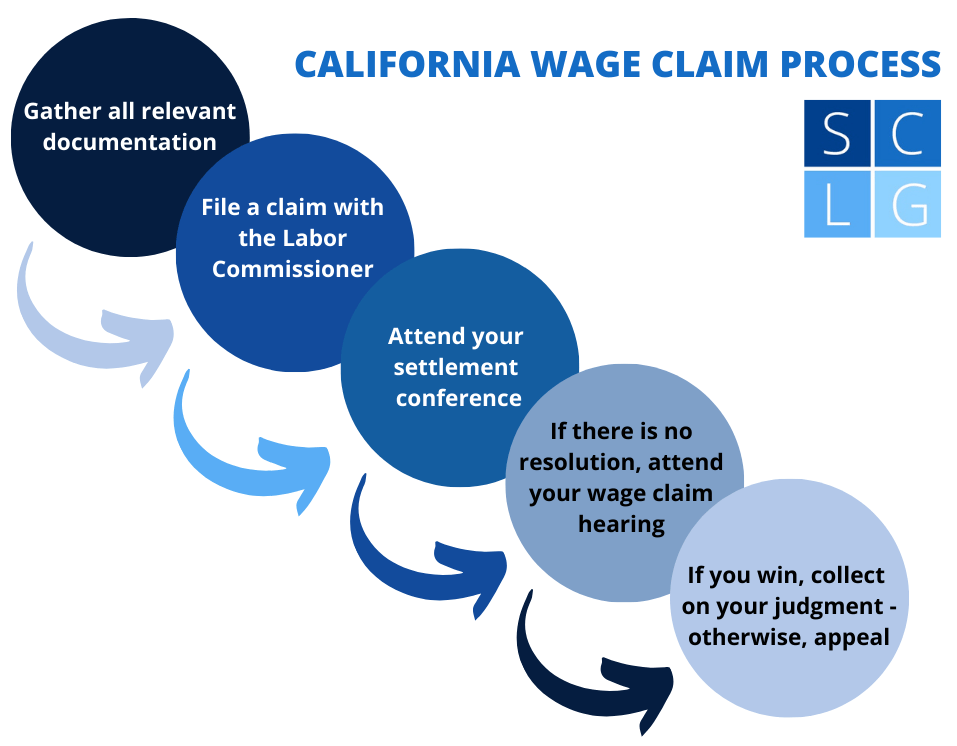
In California, you can win a wage claim by:
- understanding your legal rights,
- gathering evidence of a labor violation,
- filing a wage claim,
- helping with the investigation, and
- attending the wage claim hearing.
An employment lawyer can help, particularly if the wage claim is a complex one.

1. Understand your rights
If you do not understand your legal rights in California then you cannot invoke them. Wage disputes or claims typically involve violations involving:
- overtime law,
- the minimum wage,
- meal or rest breaks,
- rules about working off the clock, or
- wage theft.
Only if you have a basic understanding of these laws can you have an idea of whether your rights were violated or not.
It is important to know that California state employment law is more generous to workers than federal law or state laws outside of California. When you learn about your rights in the workplace, make sure you are learning about California law.
2. Gather evidence
If you learn your rights and think that your employer is violating them, the next step is to gather evidence of the violation. The relevant documents to gather will depend on the suspected violation.
The employment lawyers at our law firm have found that the following types of evidence can help in most wage claims:
- a complete listing of your work hours, including the exact times that you clocked in and out,
- a log of exactly when you took your meal and rest breaks,
- time records that show how many hours of overtime you worked,
- pay stubs, particularly if they include detailed information about your wages and overtime pay, paid time off, and deductions,
- your employment agreement or contract, and
- your employee handbook, if there is one.
3. File the California wage claim
Once you have documentation that supports your claim that your employer owes you wages, you can file your wage claim with the California Labor Commissioner’s Office at the Division of Labor Standards Enforcement (DLSE). This is the state agency in charge of handling claims of unpaid wages and wage theft in violation of the state labor code. Claims can be filed:
- using the online claim form,
- by email,
- in the mail, or
- in person.
Include your supporting documentation in the claim. According to the DLSE:
“No matter how you file your claim, the more information you can give us up front at the time of filing, the more effectively we can process your claim.”[1]
Filing this initial report begins the wage claim process.
Once the DLSE receives your claim, an investigator may look into it if they think it has merit.
4. Help with the investigation
During the investigation, the investigator from the Labor Commissioner’s Office will likely have more questions for you. Be prepared to answer them in detail. The investigator may also request additional information about your claim. This may involve gathering more evidence at your workplace.
5. Attend the labor board’s settlement conference
If the investigation finds that there was likely a violation of California wage and hour law, a settlement conference may be scheduled. Your attendance at the conference is typically mandatory. Your employer will be there as well, though many California employers are present through their lawyer.
At the conference, you will have the opportunity to present your case and the evidence that supports it. Your employer can present evidence that they have not violated the law. The hearing officer, a deputy labor commissioner, will make a finding of the facts and issue a written decision.
The settlement conference is also where you and your employer will be urged to negotiate a resolution. This may be a settlement to pay you all or some of your unpaid wages. It may also award you your attorneys’ fees. It could include a settlement agreement by your employer to change their policies.
Having an employment lawyer on your side during the settlement conference is crucial. Having an experienced attorney with you can substantially increase the odds of a successful outcome.
You or your employer can appeal the outcome of this hearing. This involves filing a petition in the local California Superior Court. In some cases where your employer has a pattern or practice of violating California labor laws, a class action may be formed.
Mind the statute of limitations
You must file a wage claim before the statute of limitations has expired. The statute of limitations only gives you a certain amount of time to invoke your legal rights. The amount of time depends on the type of wage claim you are filing. It is:
- 1 year for wage claims involving a bounced wage check or restricting your access to payroll or personnel records,[2]
- 2 years for an oral agreement to pay more than the minimum wage,[3]
- 3 years for making illegal deductions or failing to:
- pay the minimum wage,
- pay the correct overtime wage,
- provide unpaid rest and meal breaks,
- provide sick leave, or
- make reimbursements;[4] and
- 4 years for violations of a written contract.[5]
Our employment attorneys have found that most wage violation claims in California fall under the 3-year statute of limitations. However, getting the legal advice of a lawyer can ensure that you file your claim on time.
Failing to comply with the statute of limitations will mean that your case will quickly get dismissed. The evidence supporting your claim will not be examined.
Legal Citations:
[1] California Division of Labor Standards Enforcement, “How to File a Wage Claim.”
[2] California Code of Civil Procedure 340 CCP.
[3] California Code of Civil Procedure 339 CCP.
[4] California Code of Civil Procedure 338 CCP.
[5] California Code of Civil Procedure 337 CCP.

